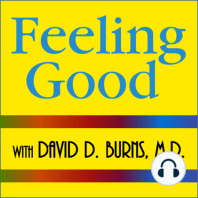50 min listen

172: Ask David: What's the Impact of Emotional Trauma on the Brain? And more
172: Ask David: What's the Impact of Emotional Trauma on the Brain? And more
ratings:
Length:
42 minutes
Released:
Dec 23, 2019
Format:
Podcast episode
Description
Happy Holidays to everyone! Today's podcast is nestled between Hanukkah (on the 22nd) and Christmas Eve (on the 24th.) We send our warmest greetings to all of our listeners of all religious faiths. Today, Rhonda, Dave and David discuss three questions you have submitted: Does emotional trauma cause brain damage? Do you have to have a good cry when something traumatic happens? Why does avoidance make anxiety worse? 1. Is it true that emotional trauma affects the brain? Hi again Dr Burns, I love the 5 secrets, and have had great success in my new job by implementing them! I keep listening to all the 5 secrets podcasts over and over to keep it fresh for me and really loved the podcast on advanced techniques. My question today is about how trauma affects the brain. ‘Trauma’ is the new buzz word in education, and psychologists are creating presentations geared for teachers and other school professionals that claim the “trauma-affected brain” is altered and cannot learn as easily. They allege imaging technology can prove this. Do you know if PTSD/trauma actually impacts a person’s ability to learn? I thought that it was the negative thoughts that interfere with attitudes toward learning, not an actual brain impairment. Another term that is used frequently is “intergenerational trauma”, meaning if my parent experienced trauma, it could be passed down to me and therefore impact my ability to cope with life stressors. Any thoughts? Any credible research you are aware of? In the Ask David, could you also include your opinion on how Adverse Childhood Experiences impact people's mental health and ability to cope? There are a range of experiences cited in studies from moving around a lot in childhood to witnessing a murder to molestation. After listening to your podcast episode 147 (Garry with PTSD) I was satisfied with the effectiveness of TEAM to treat trauma rapidly. But then I remembered a documentary I had seen about 'feral children' who were extremely neglected as children, and I wondered if there are some cases where the psychology or potential of a person is forever impacted by an adverse childhood experience. Your take? All the best, Jackie Educational Consultant Mountaintop School Division Answer David finds these buzzwords and buzz-theories somewhat misleading, and sometimes even pseudo-scientific. He has treated large numbers of patients struggling with the effects of severe trauma, and has found that trauma patients are usually the easiest to treat and the quickest to learn. David like to focus on rapid healing, using TEAM-CBT, rather than sending people the message that they are impaired, damaged or defective because of some emotionally traumatic experience. In fact, nearly all humans have experienced quite a lot of traumatic events, which can range from mild to extreme. And lots of us have some degree of brain damage. My brain (David Burns) was squashed at birth, for example, and there are certain cognitive functions that I’m not very good at. For example, for some reason, I can't often find something that's right in front of me, and I have lots of trouble remembering names and faces. I just try to accept my many shortcoming and work around them. The problem is rarely our flaws or imperfections, but rather the distorted negative messages we give ourselves; messages that generate anxiety, fear, inadequacy, shame, and so forth. Of course, animals and humans with traumatic experiences at a young age, or any age, may struggle with fear and may seem, as you say, "feral." My wife and I (David) have adopted many feral cats, and have found that consistent warmth and love can lead to dramatic changes and the development of trust. We all have a history, and every person's story and suffering deserve respect and profound compassion. 2. What’s displacement? Is it true that you have to have a good cry when something traumatic happens? Hi there again, I've been practicing TEAM-CBT for a year while at the same time studying Dr. Gordo
Released:
Dec 23, 2019
Format:
Podcast episode